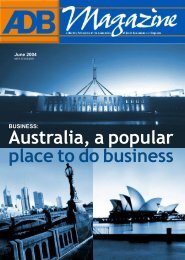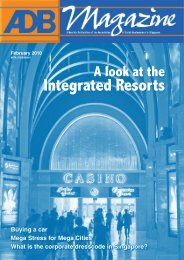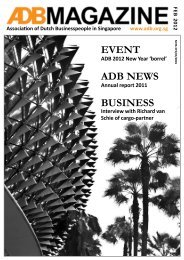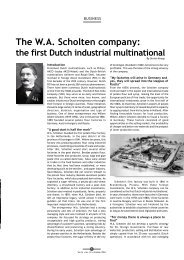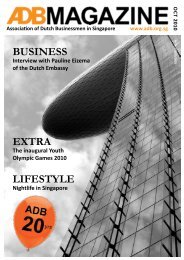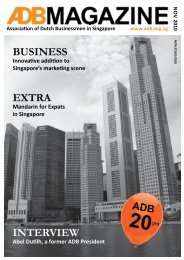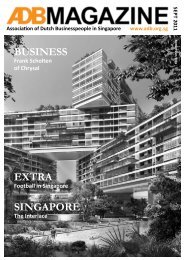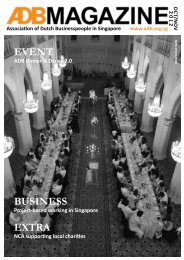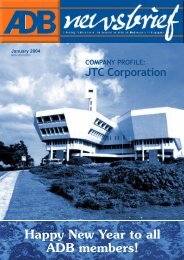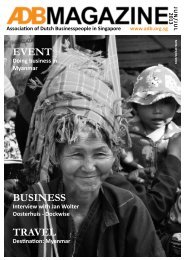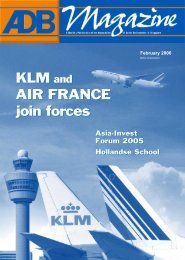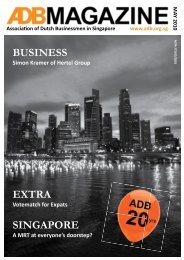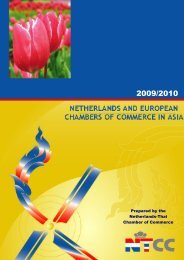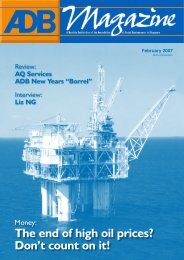August 2005 - Association of Dutch Businessmen
August 2005 - Association of Dutch Businessmen
August 2005 - Association of Dutch Businessmen
You also want an ePaper? Increase the reach of your titles
YUMPU automatically turns print PDFs into web optimized ePapers that Google loves.
INTERVIEW<br />
Interview with retiring Netherlands Ambassador, Mr.<br />
By Wil Kolen & Brigitte Velema<br />
Mr. van Pesch has reached the final stage <strong>of</strong> his<br />
now 36 year long career as representative for<br />
the <strong>Dutch</strong> queen. The position <strong>of</strong> Netherlands<br />
Ambassador in Singapore is the last one he will<br />
be completing this month.<br />
We had the opportunity to speak with Mr. van<br />
Pesch and reflect on his experiences as diplomat<br />
and ambassador for the Netherlands in the<br />
various countries he was posted.<br />
Born in Bandung, Java, 1942.<br />
His family moved to Holland when he was four<br />
years old. At the age <strong>of</strong> 16 he decided he wanted<br />
to become a diplomat and studied in Leiden<br />
before moving to Paris to take on Political Science<br />
and Arabic language. His first position was at the<br />
Foreign Service <strong>of</strong> the Ministry <strong>of</strong> Foreign Affairs<br />
in The Hague. This was the start <strong>of</strong> a great career<br />
during which he was posted in several Middle<br />
Eastern and Asian countries.<br />
Mr. van Pesch is married to Mrs. Viviane Sioufi<br />
(born Libanese) and together they have two sons.<br />
After living abroad for so many years, do<br />
you still feel ‘<strong>Dutch</strong>’?<br />
Yes <strong>of</strong> course. Although I haven’t spent that much<br />
time in Holland, by working for a <strong>Dutch</strong> institution<br />
like the Embassy I need to stay in touch with<br />
Holland on a daily basis.<br />
I have studied law in Leiden for a while, but<br />
decided to give that up and go and study in Paris<br />
instead.<br />
Why did you choose to study Political<br />
science in combination with Arabic<br />
language?<br />
Since my 16th year I decided I wanted to become<br />
a diplomat. This idea got stuck in my head and I<br />
worked towards it to make this come true. My<br />
studies in Leiden did not work out and I decided to<br />
make a definite move towards reaching my goal.<br />
During the first year at the university in Paris I<br />
had to write an essay about the Middle East conflict.<br />
In my enthusiasm over this research, I thought it<br />
would be a good idea to learn both Hebrew and<br />
the Arabic language as well. With hindside that<br />
was actually a bit naïve and idealistic step.<br />
Which country has given you the best<br />
memories and which country the worst?<br />
I’m an optimist and try to look at situations in a<br />
positive manner. From that perspective, every<br />
posting was interesting in its own right although<br />
some were easier than others <strong>of</strong> course. For<br />
instance Libya, where I spent some time, was a<br />
difficult spot. In those days the political climate<br />
wasn’t that good under Khadafi.<br />
I had the position <strong>of</strong> Chargé d’Affaires and did<br />
not have any superiors and therefore carried sole<br />
responsibility. Once I had visitors over from the<br />
Union bicycle factory to try and set up a business<br />
in Lybia. On their <strong>of</strong>f-day, these guys went out sight<br />
seeing in Tripoli but were then accused <strong>of</strong> spying<br />
and immediately arrested. This was <strong>of</strong> course<br />
ridiculous, but it became a difficult situation and<br />
I helped them by getting rid <strong>of</strong> the ‘evidence’.<br />
After which they still had to spend some time in<br />
jail for interrogation.<br />
The most interesting country was China. I<br />
remember when we arrived there in 1980. It wasn’t<br />
very developed then and there weren’t many lights.<br />
We had some trouble to get into the country<br />
because our newborn baby wasn’t included in the<br />
visa application.<br />
While driving into Beijing, the road was<br />
completely dark and I was thinking, where have<br />
we arrived?<br />
During my stay there I experienced the<br />
Taiwanese submarine crisis, which was a very<br />
sensitive case that stirred up some dust and is not<br />
easily forgotten by the Chinese government.<br />
In wintertime, there wasn’t much available<br />
although we received some supplies from Hong<br />
Kong.<br />
I could not speak or read the language and<br />
<strong>of</strong>ten depended on translators.<br />
Sometimes we had to deal with translators<br />
who had studied the <strong>Dutch</strong> language in Surinam,<br />
which was tough at times as we weren’t sure how<br />
our words would be interpreted.<br />
But I always wanted to look at the bright side<br />
<strong>of</strong> things. You learn to deal with these situations<br />
and look at things in a more relative manner.<br />
While living there and discussing the situation,<br />
I received some advise from one <strong>of</strong> my diplomat<br />
colleagues; In the life <strong>of</strong> a diplomat there are two<br />
most important aspects to take care <strong>of</strong>: Your kids<br />
and your teeth; you never know how your kids can<br />
be affected by living in foreign countries and<br />
through constantly changing environment. The<br />
dentists never agree with each other, so you may<br />
end up with dental renovations all the time.<br />
What is your favorite Singaporean food?<br />
I love spicy food, Indian and Indonesian style.<br />
Indonesian curry based dishes are my favorite.<br />
16<br />
Vol.15 • No. 6 • July/<strong>August</strong> <strong>2005</strong>



